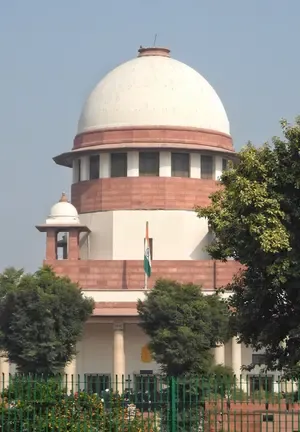Did SC Grant Interim Protection to Journalists Alleging Assault by MP Police?

Synopsis
Key Takeaways
- Supreme Court grants interim protection to journalists.
- Petitioners urged to approach the Madhya Pradesh High Court.
- Allegations of assault linked to reporting on illegal activities.
- NHRC takes cognizance of the situation, demanding reports.
- Press freedom remains a critical issue in India.
New Delhi, June 9 (NationPress) The Supreme Court has provided interim protection from arrest to two journalists from Madhya Pradesh who claimed to have been assaulted and mistreated at the behest of Bhind's Superintendent of Police due to their investigative reporting on illegal sand mining in the Chambal River.
A bench comprising Justices Prashant Kumar Mishra and Manmohan instructed the petitioners, Shashikant Jatav and Amarkant Singh Chouhan, to seek additional relief from the Madhya Pradesh High Court within two weeks.
The Justice Mishra-led bench ordered that the journalists would not be arrested in the interim, emphasizing that it would be up to the Madhya Pradesh High Court to consider any requests for extending this interim protection.
On June 4, another bench of Justices Sanjay Karol and Satish Chandra Sharma of the Supreme Court had acknowledged the writ petition filed by the two journalists but refrained from issuing any interim order against coercive actions.
The Justice Karol-led bench pointed out that before any interim order could be made, the facts must be presented by the Madhya Pradesh government. They remarked, "If you commit a crime like murder, can we just deny you any coercive action order? We lack clarity on the crimes registered against you," urging the petitioners’ counsel to include Bhind’s SP in the petition.
The journalists stated they were compelled to leave their hometown due to severe threats received after uncovering illegal sand mining practices in the Chambal River, allegedly facilitated by local police.
In their writ petition to the Supreme Court, they identified IPS officer Asit Yadav and his team as key figures responsible for the alleged abuses, asserting that the actions were retaliatory due to their investigative efforts.
They reported incidents of custodial assault, caste-based abuse, kidnapping, and ongoing harassment from the Bhind police.
Meanwhile, the National Human Rights Commission (NHRC) has taken suo motu cognizance of the violent treatment faced by the two journalists, who reportedly face serious threats to their safety from the Bhind police.
The NHRC issued a notice to the Director General of Police (DGP) of Madhya Pradesh, demanding a comprehensive report on the situation within two weeks. The commission noted a press release from the Press Club of India, indicating that if the claims are accurate, they constitute a grave violation of the journalists' human rights.










